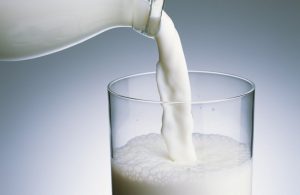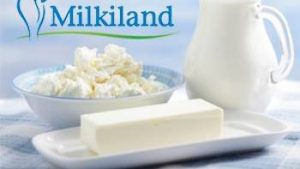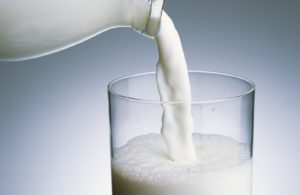
Milkiland, a dairy group with assets in Ukraine and the Russian Federation, ended January-September 2020 with a net loss of EUR 29.03 million, which is 2.5 times more than in the same period in 2019.
According to the group’s report on the Warsaw Stock Exchange, Milkiland’s consolidated revenue decreased by 54.6%, to EUR 43.98 million in the nine months of 2020, as a result of a noticeable drop in the Russian segment of the group’s business. Gross profit decreased by 52.4%, to EUR 6.33 million, and operating loss by 50%, to EUR 9.46 million.
In the reporting period, Ukraine was the largest geographic segment for Milkiland, providing 59% of the group’s revenue (an increase of 19 percentage points compared to the same period in 2019). The segment’s revenues decreased by 33% to EUR 26 million, mainly due to lower sales volumes of the Ukrainian subsidiaries and lower export volumes.
The Russian Federation accounted for 41% of the group’s revenue in January-September 2020, compared with 57% for the corresponding period last year. The segment’s revenue decreased by 66.7%, to EUR 17.97 million, mainly due to a drop in sales of the Russian subsidiaries.
Whole-milk dairy was the largest segment in term of revenue, providing for 39% of revenue in the nine months of 2020 (9 percentage points down from the same period last year). The segment’s revenue decreased by 63%, to EUR 17 million, due to lower sales in Russia and Ukraine, partially offset by the appreciation of the main operating currencies against the euro.

Milkiland, a dairy group with assets in Ukraine, the Russian Federation and Poland, saw EUR 7.62 million of net loss in January-March 2020, which is 2.1 times more than in the same period in 2019.
According to the group’s report on the Warsaw Stock Exchange website, Milkiland revenue in the first quarter decreased by 22.8%, to EUR 22.79 million, gross profit – by 37%, to EUR 2.29 million, while operating loss increased 1.6 times, to EUR 2.86 million. Milkiland increased EBITDA with a negative value 5.6 times, to EUR 1.25 million.
Ukraine contributed 34.9% to the group’s revenue in Q1 2020 (1 pp decline y-o-y). Segment revenue decreased by 25.7% to c. EUR 7.95 million, again mainly due to increased selling prices for finished goods in line with general markets trends, as well as selling of higher value-added goods.
Poland contributed 7.8% to the group’s revenue in Q1 2020 (up 1 pp y-o-y), the segment’s revenue decreased by 10.3% y-o-y to c. EUR 1.79 million on the back of lower sales volumes.
Russia was the largest geographical segment in terms of revenue generation for Milkiland in Q1 2020 providing for 58% (up 0.7 pp compared to Q1 2019). The segment’s revenue was down by 21.9% y-o-y and stood at c. EUR 13.22 million, mainly due to selling volumes contraction triggered by lower processing volumes.
Whole-milk dairy was the largest segment in term of revenue providing for c. 41% of revenue in Q1 2020 (vs 51% in Q1 2019). The segment’s revenue declined by 38.4% y-o-y in Q1 2020 to EUR 9.3 million on a back of lower sales volumes.
Cheese & butter segment contributed approximately 33% to the group’s total revenue in Q1 2020 (35% in Q1 2019). Segment’s revenue decreased by 26.4% to EUR 7.6 million due to lower sales volumes in Russian, as well as export markets.
In Ingredients segment, revenue grew by c.41% y-o-y to EUR 5.9 million on the back of increased sales volumes, including at EU market. It contributed c. 26% to the group’s total revenue versus 14% in Q1 2019.
In the first quarter of 2020, Milkiland decreased its overall sales volumes by c. 40% y-o-y, mainly due to implications of the global COVID-19 crisis in the markets of the group’s operations. Lower volume sales of cheese and butter and whole-milk products were partly offset by increase of sales volumes of ingredients.
Aiming to support the profitability of the business Milkiland Ukraine focused on the development of sales of high value-added products, including innovative lactose-free cheese and whole milk products, primarily in the key accounts channel. But massive import of dairy to Ukraine, primarily from EU, growing competition in the local market together with limited export opportunities on the back of relatively high raw milk farmgate prices brought the EBITDA of Milkiland Ukraine to negative territory (c. EUR 0.2 million, negative vs c. EUR 0.2 million in the same period of 2019).
The lion’s share of the contraction of sales volumes in Q1 2020 was delivered by the group’s main Russian subsidiary – Ostankino. Fist reason for that is the inability of Ostankino to persuade some key clients, namely local retailers, to increase the shelf prices for the finished goods in line with general Russian dairy market trends. As the result, the collaboration with some key clients was diminished or interrupted in the reporting period.
Milkiland said that second reason is that Ostankino faced the most deep negative implications of the COVID-19 crisis in Russia. Strict quarantine measures imposed by the Russian Government, as well as municipal authorities of the City of Moscow in March 2020, inter alia, were included closure of the shopping centers, obligatory self-isolation of the population in their households. The latter requirement provoked the migration of a significant amount of Moscow inhabitants to the rural areas during quarantine period. On the back of this situation, Ostankino’s sales declined significantly (by more than c. 40% in value terms in Q1 2020 on y-o-y basis), which brought the EBITDA of this subsidiary to the negative territory.
On March, 6, 2020, the Arbitrage Court of Kursk oblast of Russian Federation adopted a decision of insolvency of LLC Kursk Milk, subsidiary of Milkiland RU, implemented the arbitrage management of this company and appointed an arbitrage administrator. Since that time, the group lost the control on operations of LLC Kursk milk, the financial results of this company was incorporated to the consolidated results of Milkiland Group only partially. This situation led to some difficulties in production and sales of several SKU’s in the product portfolio of Milkiland in Russia, including under Dobryana and Latter brands. The management of the group has been striving for entering into the debt settlement agreement with the creditors of LLC Kursk Milk.
Milkiland EU in Q1 2020 reported tiny positive profitability on EBITDA level of c. EUR 0.014 million due to better pricing environment for sales of dry milk products in EU and globally in comparison with negative EBITDA of c. EUR 0.4 million in Q1 2019.
In Q1 2020 Milkiland continued to develop its sales in new export markets and catch the opportunities of profitable international trade in the global dairy market. In particular, Milkiland Intermarket managed to increase the sales of dry milk products in Q1 2020 by 20% in volume terms on y-o-y basis due to the restoration of sales of the respective products produced by the group’s Polish subsidiary Milkiland EU in the European market.

Milkiland, a dairy group with assets in Ukraine, Russia and Poland, received EUR 11.6 million in net loss in 2019, which is 41.2% less than in 2018.
According to the group’s annual report on the website of the Warsaw Stock Exchange, its revenue fell by 5.2%, to EUR 125.76 million over 2019.
The gross profit of the group compared to 2018 decreased by 15.6%, to EUR 16.46 million. Milkiland increased its operating loss by two times, to EUR 20.44 million in 2019.
The group’s EBITDA decreased by 72.2%, to EUR 585,000, EBITDA margin was 0.5% in 2019 compared to 1.6% in 2018.
The company’s net liabilities decreased by 10.4%, to EUR 76.71 million by the end of 2019. The total assets of the company increased by 17% and as of December 31, 2019, amounted to EUR 177.81 million.
The revenue in the segment of whole milk products decreased by 11%, to EUR 57.64 million in 2019 compared to 2018 (46% of total revenue); in the segment of cheese and butter by 17%, to EUR 42.11 million (33%); in the segment of milk powder and other products increased by 52%, to EUR 26 million (21%).
The Russian market generated 57% of the revenue of Milkiland, the Ukrainian market had 40%, the Polish market had 3% in 2019.
The company said in the statement that in 2019 Milkiland, on the one hand, increased the presence in export markets, on the other, experienced difficulties caused by adverse changes in the macroeconomic situation, as well as the difficult situation in dairy markets in the main countries of operation.
In particular, Milkiland continued its expansion into the Chinese dairy market, supplying dried milk products to this country. The group also supplied kosher dairy products, such as dried milk products and butter, to Israel.
In the dairy market of Ukraine, the company faced rising costs for raw materials amid rising prices for raw milk at farms (8% more on average in 2019 year-over-year). According to the company, this trend, as well as the revaluation of the hryvnia to euro, led to the fact that, as of December 31, 2019, prices for raw milk in Ukraine were 19% higher than in EU compared to the beginning of 2019, which provoked a sharp increase in imports of dairy products (48% year-over-year), primarily from EU to Ukraine.
Milkiland said that imports put pressure on Ukrainian manufactures, especially cheese producers, and many of them were on the verge of zero profitability (cheese imports increased by 73% in 2019, compared to 2018).
Milkiland intends to complete the process of changing registration by the end of August 2020.

Milkiland, a dairy group with assets in Ukraine, Russia and Poland, saw EUR 11.39 million in net loss in January-September 2019, which is 15.1% more than a year ago.
According to a report of the group on the Warsaw Stock Exchange (WSE), consolidated revenue over the period slightly fell – by 2.3%, to EUR 96.57 million, and earnings before interest, taxes, depreciation and amortization (EBITDA) fell by 85.3%, to EUR 0.66 million.
In the nine months of 2019 Milkiland decreased its overall sales volumes by c. 29% on the back of significantly lower sales of cheese and butter products, which profitability were undermined by “the costs-prices scissors,” when the prices for finished goods lag behind the growing cost of the raw materials, namely, raw milk prices both in Russia and Ukraine. The prices for raw milk in Ukraine and Russia in January-September 2019 were by 9% and by 7.5% higher on average on year-over-year basis, respectively.
“Those unfavourable trends were aggravated by the situation with the appreciation on UAH and RUR against EUR in the reporting period,” the company said.
Due to the “scissors” effect and the growing completion in the Russian dairy market, first of all, in the market of the City of Moscow, Ostankino decreased the sales volumes of the whole-milk products by c. 9%, which led to decline of profitability of its business on EBITDA level by 6 pp. to practically zero on year-over-year basis.
Milkiland Ukraine in January-September 2019 focused on the development of sales of high value-added products, including innovative lactose-free cheese and whole milk products, primarily in the key accounts channel. As the result, this subsidiary of Milkiland managed to preserve its EBITDA margin almost at the same level of c.3% as in in January-September 2018.
Milkiland EU over the period faced a significant deterioration of the traditional business of the production and selling of dry milk products (WPC, permeate) triggered by non-favorable situation with the prices for these products in the global market, as well as declining sales of the cheese-mix products at the domestic market of Poland. As the result, the company generated losses at EBITDA level, which also decreased the overall EBITDA result of the group.
Milkiland Intermarket increased the sales of the group’s dry milk products in China and Kosher goods sales in Israel. The share of these two countries in the total sales of Milkland Intermarket exceeded 60%. The sales volumes of the dry milk products and butter by this company increased by c. 25% in January-September 2019 on year-over-year basis.
At the same time, growing input costs in Ukraine and revaluation of the Ukrainian currency against EUR and USD during the reporting period led to the situation, when the EBITDA margin of this increased sales slid to the negative territory.

Milkiland, a dairy group with assets in Ukraine, Russia and Poland, saw net loss of EUR 7.28 million in January-June 2019, which is 2.9 times more than a year ago.
According to a report of the group on the Warsaw Stock Exchange (WSE), consolidated revenue in January-June 2019 slightly fell to EUR 65.88 million, and earnings before interest, taxes, depreciation and amortization (EBITDA) fell by 85.3%, to EUR 0.53 million.
“This stable result was triggered by significantly higher top-line in Ukraine (+c.36% year-over-year) compensated by lower sales in Russia and Poland (c. 8.5% and c. 45% on year-over-year basis, respectively). Positive dynamics of the group’s sales in Ukraine in H1 2019 relied on the higher sales of butter, stable sales of whole-milk products partly offset by the declined sales of cheese,” the company said in the document.
Lower top-line in Russia was fully triggered by the decline of whole-milk products sales, while in Poland the group faced the drop of cheese and dry milk products sales both in volume and value terms due to shorten operations in this country.
As the result of the lower cheese sales in Ukraine and Poland the group’s overall sales in Cheese&Butter segment in the reporting period declined by 19% to EUR 19.7 million on year-over-year basis, the share of this segment revenues in the total revenues of the group slid from 37% in H1 2018 to 30% in H1 2019.
Whole-milk product segment still being the largest contributor to the Group’s revenues in H1 2019 (with the share of 48% vs 50% of the total revenues in H1 2018) demonstrated a 4% correction in value terms, caused mostly by the decline of the sales volumes in Russia by c. 10% in comparison with the same period of 2018.
The group said that better pricing at the global market of dry milk products contributed to noticeable growth of the revenues of Ingredients segment, which increased by c. 62% in the first half of 2019 in comparison with the same period of the last year on the back of almost two-fold increase of the sales volumes of these products. The share of the respective revenues of the segment in the total revenues of the group, consequently advanced from 14% in H1 2018 to 22% in the reporting period.
Operating loss over the period fell by 80.8%, to EUR 9.11 million. Gross profit decreased 24.2%, to EUR 8.57 million.
“Total liabilities increased by c.15% as of 30 June 2019 in comparison with 30 June 2018 mainly resulting from a c.21% growth in current liabilities in turn triggered by the noticeable increase of trade and other payables from c. EUR 49 million as of June 30, 2018 to c. EUR 80.4 million on the same date of the current year,” the company said.

Milkiland, a dairy group with assets in Ukraine, Russia and Poland, in January-September 2018 saw EUR 13.42 million of net loss compared with EUR 4.55 million of net profit a year ago.
According to an unaudited report of the group posted on the website of the Warsaw Stock Exchange (WSE), revenue over the period fell by 6.6%, to EUR 98.8 million, and gross profit – by 24.4%, to EUR 15.92 million. Earnings before interest, taxes, depreciation and amortization (EBITDA) grew 1.8-fold, to EUR 4.38 million.
Milkiland in January-September 2018 saw EUR 3.41 million of operating loss compared with EUR 3.01 million of operating profit a year ago.
The loan portfolio of the group was EUR 86.2 million as of September 30, 2018 compared with EUR 86.6 million as of late 2017, mainly thanks to repayment of the indebtedness under the restructuring agreements with Ukrainian and Polish banks. Net debt of the group declined by 1%, to EUR 85.7 million as of September 30, 2018.
The Russian market provided for EUR 59.53 million of the group’s revenue, the Ukrainian market – EUR 28.93 million and the Polish market – EUR 10.47 million.
Cheese & butter segment contributed approximately 38% to the group’s total revenue. Segment’s revenue increased by 19% to EUR 37.34 million, the whole-milk dairy segment – EUR 47.33 million (48% of total revenue) and the ingredients segment – EUR 14.26 million (14%).
“In 9M 2018 Milkiland Ukraine focused on the development of sales of high value-added products, including innovative lactose-free cheese and whole milk products, primarily in the key accounts channel. The company also paid an attention to production and export sales of Kosher dry milk products and butter under the contract with key client from Israel,” the company said.
In 9M 2018 Milkiland put additional efforts aimed at the entering to new and development of the sales at the existing export markets. In line with these efforts, Milkiland Intermarket continued a development of the distribution network of the group’s dry milk products and butter in China. Additional volumes of cheese-like products were sold to the traditional market of the group in Kazakhstan, as well as other Central-Asian countries. The company also continued a fulfillment of the Kosher goods supply contract with the key client in Israel.